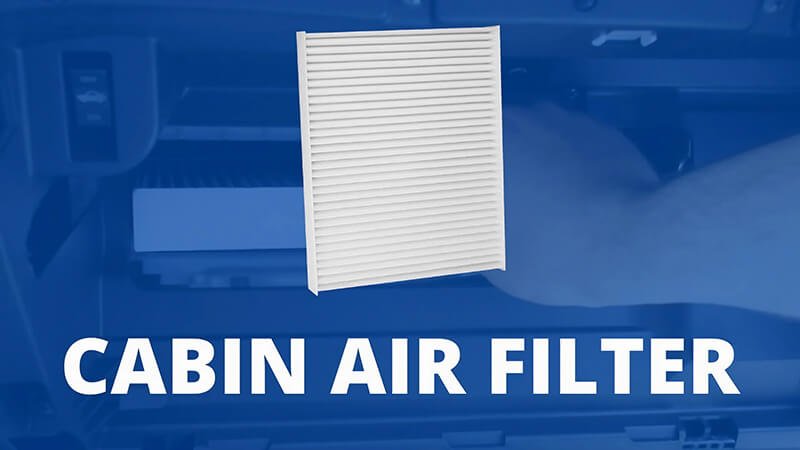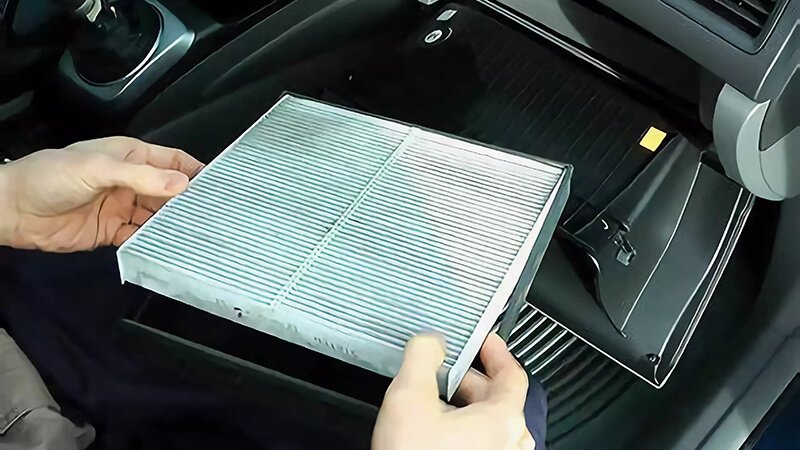If you’ve ever noticed reduced airflow or strange smells inside your car, the cabin air filter might be to blame. Many drivers overlook this crucial part of their vehicle's maintenance, but changing your cabin air filter regularly is essential for both comfort and health. Let’s explore how often you should change it and why it's so important.
Cabin air filters should be replaced every 15,000 to 30,000 miles, though this varies depending on your car’s model. Factors like air quality, driving conditions, and usage play a role. Always check your vehicle’s manual for precise recommendations to keep your air clean and your HVAC system functioning smoothly.
The cabin air filter’s role goes beyond just cleaning the air; it also affects the air circulation system. So, how long should a cabin air filter last before it needs replacing? Let's dive into the specifics.

How Long Should a Cabin Air Filter Last?
The lifespan of a cabin air filter depends on several factors, including driving conditions, the quality of the filter, and how often the vehicle is used. Understanding how long a cabin air filter lasts can help you maintain better air quality in your car.
Typically, a cabin air filter lasts between 15,000 and 30,000 miles. However, this can vary based on factors like dust levels, pollution, and driving habits. For example, frequent driving in dusty or urban areas might shorten its lifespan.
Cabin air filters are designed to capture dust, pollen, and other contaminants that could affect the air quality inside your vehicle. In general, they are built to last anywhere from 15,000 to 30,000 miles, but this isn’t a fixed rule. The lifespan of a filter can be affected by a number of factors, including driving environment and the filter’s material.
Factors Affecting Cabin Air Filter Lifespan
| Factor | Impact on Filter Life |
|---|---|
| Driving Conditions | Dusty roads and city traffic shorten lifespan |
| Filter Quality | High-quality filters last longer, providing better filtration |
| Vehicle Usage | Frequent short trips put more strain on the filter |
| Air Pollution Levels | Areas with high pollution will wear out the filter faster |
| Weather Conditions | Humid or rainy weather accelerates filter clogging |
For instance, if you often drive in urban areas with a lot of traffic or dust, your filter might need to be replaced sooner than the 30,000-mile mark. On the other hand, if you primarily drive on highways in clean areas, your filter might last closer to 30,000 miles or even longer.
Runex Auto offers high-quality cabin air filters1 that are built to last, ensuring that your vehicle maintains good air quality and optimal performance. Choosing quality over price can make a significant difference in both longevity and efficiency. If you're uncertain about the lifespan of your current filter, it's a good idea to inspect it regularly and replace it when necessary.

What Happens If You Don't Change Cabin Air Filter?
Neglecting to replace your cabin air filter can lead to more than just poor air quality. In fact, it can negatively impact your car’s HVAC system, leading to costly repairs. Let’s look at the consequences of ignoring this important maintenance task.
Failing to replace your cabin air filter can result in reduced airflow, unpleasant odors, and even damage to your HVAC system. In severe cases, it may cause the system to work harder, leading to higher energy consumption and potential system failure.
When you don’t replace your cabin air filter, you’re risking several issues that can compromise both your comfort and vehicle performance. The most immediate problem is a decrease in airflow. As the filter becomes clogged with debris, air struggles to pass through, leading to reduced airflow in the cabin. This can make your vehicle’s HVAC system less effective, causing it to work harder to cool or heat the air.
Common Problems Caused by a Clogged Cabin Air Filter
| Problem | Effect | Possible Consequences |
|---|---|---|
| Reduced Airflow1 | Air struggles to pass through, reducing comfort | Overworked HVAC system, uncomfortable cabin environment |
| Musty Odors2 | A clogged filter can trap moisture, causing mold growth | Airborne mold, respiratory issues |
| HVAC System Damage3 | Overworking the system can lead to costly repairs | Increased repair costs, system failure |
| Poor Fuel Efficiency | Increased resistance in the system | Higher fuel consumption due to overworking engine |
Furthermore, when moisture gets trapped in a clogged filter, it can lead to musty odors inside the car. This is a sign that mold or bacteria are beginning to grow, which can negatively impact your health, especially if you have respiratory issues.
In some cases, ignoring the cabin air filter can even lead to damage in the HVAC system itself. The system has to work harder to circulate air, which can cause premature wear and tear. Ultimately, you may end up paying for repairs or replacements that could have been avoided with simple, routine maintenance.
Runex Auto’s high-quality cabin air filters ensure proper airflow, reducing the risk of HVAC system overstrain, poor air quality, and costly repairs.

How Do I Know When My Cabin Air Filter Needs Replacing?
Knowing when to replace your cabin air filter isn’t always easy, but there are signs you can watch for. By paying attention to changes in your car’s performance and air quality, you can prevent problems before they escalate.
The most obvious signs that your cabin air filter needs replacing are reduced airflow, musty odors, or visible dirt and debris on the filter. If you notice any of these, it’s a good idea to check or replace the filter to maintain optimal air quality and system performance.
Several symptoms indicate that your cabin air filter is due for a replacement. If you experience weak airflow1 from the vents, despite setting the air conditioning or heater to high, it’s a clear sign that the filter is clogged. A cabin air filter that’s saturated with dust, pollen, or debris prevents air from circulating properly, reducing the effectiveness of your vehicle's ventilation system.
Key Indicators for Replacing Cabin Air Filter
| Indicator | What It Means | Action Required |
|---|---|---|
| Weak Airflow | Filter is clogged and restricting air | Inspect or replace the filter |
| Unpleasant Odors | Mold or bacteria buildup in the filter | Replace filter and clean HVAC system |
| Dusty Cabin | Filter can no longer trap dust and allergens | Replace filter to improve air quality |
| Noise from Ventilation | The system is overworking to push air through | Replace filter to reduce system strain |
Another sign is an increase in odors inside the vehicle. Musty or stale smells may indicate mold or mildew growth in the filter. When the filter is clogged, moisture can’t escape, creating the perfect breeding ground for mold and bacteria.
Also, if you notice an increase in the amount of dust inside the cabin, it might mean the filter is no longer functioning properly. In addition to dust, you may also start to see an increase in allergens circulating in the air, especially if you have a sensitive respiratory system. Replacing the cabin air filter2 will help restore the air quality and ensure that your HVAC system runs smoothly.

How Often Do You Really Need to Change Car Air Filter?
You might be wondering, is it necessary to replace the cabin air filter every 15,000 to 30,000 miles? Let’s break down the factors that determine how often you should replace this important component and how you can extend its lifespan.
While the general recommendation is to replace the cabin air filter every 15,000 to 30,000 miles, it depends on factors such as your driving environment, vehicle model, and air quality. In dusty or polluted areas, you may need to replace the filter more frequently.
The frequency with which you need to replace your cabin air filter1 depends on various environmental factors. If you live in an area with high levels of air pollution, frequent dust storms, or heavy traffic, your filter will likely clog faster. This means you’ll need to replace it more frequently to ensure optimal air quality inside your vehicle.
Factors Influencing Cabin Air Filter Replacement
| Factor | Impact on Replacement Frequency | Recommended Action |
|---|---|---|
| Driving in Urban Areas | Increased pollution and debris means more frequent replacements | Replace every 15,000 miles or less |
| Country Roads & Dust | Dusty roads lead to quicker clogging of the filter | Replace every 15,000-20,000 miles |
| Climate Conditions | Humid or rainy climates increase moisture, leading to mold and bacteria growth | Check and replace filter more frequently in these conditions |
On the other hand, if you mainly drive in rural areas with cleaner air, your filter may last closer to the 30,000-mile mark. Regularly checking your cabin air filter can help you avoid potential issues with airflow or air quality and ensure that your vehicle’s air system remains efficient.
By choosing high-quality filters2, like those from Runex Auto, you can extend the life of your cabin air filter and reduce the frequency of replacements, ultimately saving on maintenance costs and improving your vehicle's overall performance.

Conclusion
In conclusion, while the general recommendation is to replace your cabin air filter every 15,000 to 30,000 miles, the actual frequency depends on several factors, including driving conditions and air quality. Paying attention to signs like reduced airflow or unpleasant odors can help you identify when it’s time for a replacement. Using high-quality filters like those from Runex Auto ensures better air quality, improved system performance, and long-term cost savings.
-
Explore the benefits of cabin air filters to understand how they improve air quality and vehicle performance. ↩ ↩ ↩ ↩
-
Understanding the effects of reduced airflow can help you maintain your vehicle's comfort and performance. Explore this link for detailed insights. ↩ ↩ ↩
-
Discover how musty odors can indicate serious issues with your cabin air filter and health risks. This resource provides essential information. ↩













